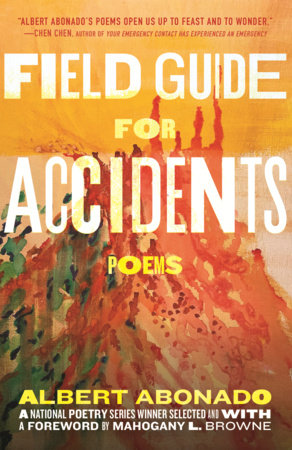Field Guide for Accidents / Albert Abonado / Beacon Press, October 22, 2024 – $18 (paperback)
Starving and unstoppable: Albert Abonado’s latest poetry collection, “Field Guide for Accidents,” traces the paths of a lost poet unraveling his identity and his grief. Abonado uses each of his poems as bread crumbs—leaving behind trails of blood, fruit peels, tongues, and prayers—as the reader attempts to find where these paths converge.
The collection is largely anecdotal. Abonado writes about childhood games he used to play with his brother, jokes his friends used to make, pulling white hairs from his father’s head, and watching his mother peel a mango. He writes about food—eating rice from his fingernails during Kamayan, pretending to dislike the smell of dried fish and soy sauce—and the prayers that came before each meal. Abonado reminisces on these memories, but he also consumes them. Instead of stopping to reflect on the meaning of these images, Abonado starves to find another perfect moment, and much like the car accident that drives this collection, he swallows everything in his path. His need for consumption turns each poem into a repository for lost memories.
To Abonado, consumption is survival. Rifling through these images, he offers fragments—trades of wounds and tenderness—and trusts the reader to piece them together, to offer them a “guide” from which they can deduce their own meaning. Meanwhile, consumption is also performance. Abonado, being a child of Filipino immigrants living in Long Island, grapples with a liminal identity—in which white people perceive his skin color but do not accept his identity. Abonado reflects on how he forced himself to swallow whiteness in an effort to distinguish himself in “an America saturated with color”—how his “hunger must be as quiet as rice” so he consumes a performance of whiteness instead.
Through scattered images of a fading childhood, Abonado relentlessly consumes a past that faces its destruction. However, the beauty in this collection presents itself as Abonado slowly reconciles his relationship with the world—as he slows down and realizes that even after the shattering and the destruction, the world patiently begins to heal.
– Diego Carvajal Nuñez

